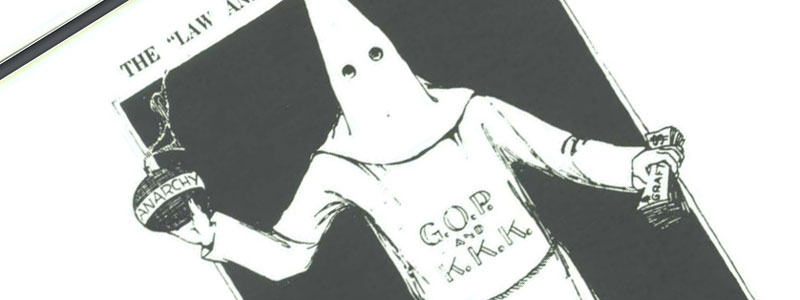A Century of Slime-Throwing
We’re approaching one hundred years since Rhode Island experienced what might be called a “Klan scare.” During the 1920s, especially in the months preceding the election of 1924, the Rhode Island political and media landscape was consumed with an effort to root out and thwart efforts to recruit to the Ku Klux Klan. We think of that organization as primarily racist, but it would be more accurate to say that it focused mainly on peddling bigotry, and during that phase of the organization’s existence in Rhode Island, it was mainly anti-Catholic.
This observation derives from an article by Norman Smith in a 1978 edition of Rhode Island History, a publication of the Rhode Island Historical Society: “The target of Klan antipathy was, as everywhere, Catholicism, with traces of hostility toward Negroes and Jews, although one gathers that anti-Catholicism was the most prominent theme around the Narragansett Bay area” (p. 44). None should be surprised that Phil Eil skips over this point when he includes a link to Smith’s article in his post on the progressive UpriseRI cataloging “Rhode Island’s Dark History.” After all, people are naturally more apt to condemn those bigotries with which they disagree.
Reading Smith’s article, one theme will bring a feeling of familiarity to conservative Rhode Islanders across the decades. The facts of the essay point in one direction: The Republican-led General Assembly issued a resolution condemning the Klan in February 1924, and in April, the Republican state convention passed a “unanimous condemnation of the Klan” (p. 37). Furthermore, “neither numbers nor names of alleged Klan-endorsed candidates were ever given, and… no candidate publicly acknowledged Klan support” (p. 40).
Yet, the rhetoric is something different. Indeed, Smith’s article begins with a political cartoon from the Providence News (which appears to have been a pro-Democrat publication) equating the GOP and the KKK. Smith reports that northern Democrats actually faced a challenge getting their national party to condemn the Klan, yet he qualifies the RIGOP’s resolution to do so by quoting the Providence Journal report that the Democrat state convention had insisted that the Republican convention “was not sincere in its pretended opposition to the Ku Klux Klan” (p 37).
“Throughout this period the [Providence] News steadfastly maintained that ‘the Klan in Rhode Island is an adjunct of the Republican Party'” (p. 38), but not surprisingly:
Election day came and went. Hopes of Democrats for sizable gains based on Klan issues were dashed. … It may defy coincidence that following the election major newspaper coverage of the Klan practically ceased. (p. 40)
To be sure, life, society, history, and politics are all complicated. Smith reports that the Klan managed to persuade some individuals in the military, in labor unions, and elsewhere at least to consider joining, and it’s entirely plausible that some Republicans (and some Democrats, too, for that matter) had something in common with the organization, whether a bigotry (e.g., anti-Catholicism), a general value (e.g., “national pride”), or just a specific policy suggestion.
From the perspective of a century later, however, the Democrats’ general slander of Republicans as equivalent to this hated organization stands out, because it continues to this day. Even Norman Smith, who apparently could not cite a single connection beyond partisan insinuations, could not help but give the accusers some credibility: “To the extent that Republican forces only formally rejected the Klan late in 1924 and seldom specifically thereafter, there was presumably a modicum of truth in the partisan allegations” (p. 44).
In other words, even back in 1978, and even looking through the murk of decades to 1924, the long-cultivated attitude has been that non-progressives accused of character-staining associations must be sure to leave an unmistakable (and impossible-for-history-to-lose) record of denials. Of course, many conservatives today know from experience that the trap of such a response is the accusation that too much denial proves a guilty conscience. It is always possible to insist that proclamations are “only formal.”
After a century of this particular attack, it’s about time for an effective defense to be found.




